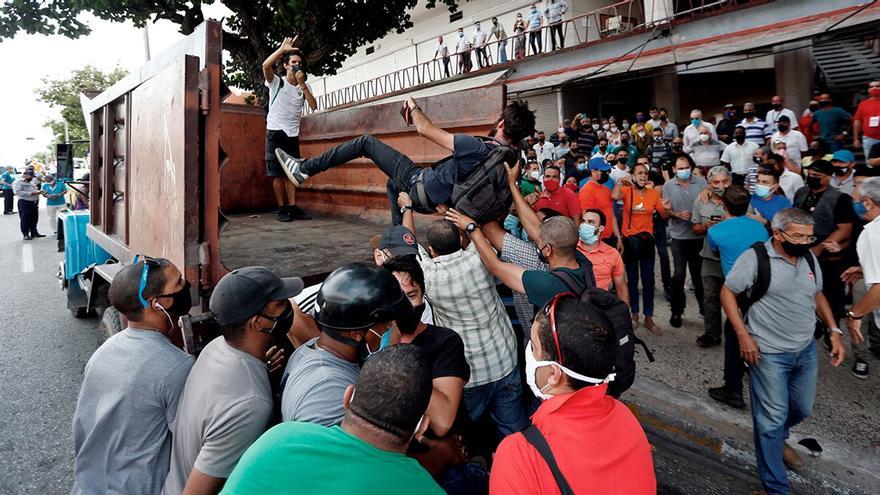
![]() 14ymedio, Havana, 21 March 2022 — To the massive protests of July 11 and 12, 2021, the Cuban government responded “with disproportionate and methodical political and judicial violence, which far exceeds the specific and spontaneous episodes of violence committed during the uprising by a few citizens,” denounced a group of Cuban artists and intellectuals in a letter published on Monday.
14ymedio, Havana, 21 March 2022 — To the massive protests of July 11 and 12, 2021, the Cuban government responded “with disproportionate and methodical political and judicial violence, which far exceeds the specific and spontaneous episodes of violence committed during the uprising by a few citizens,” denounced a group of Cuban artists and intellectuals in a letter published on Monday.
So far, the document titled “Manifesto against silence, for justice” has been signed by more than 40 public figures including filmmakers Fernando Pérez and Juan Pin, writer and translator Alex Fleites, historians Alexander Hall and Leonardo Fernández Otaño and journalist Jorge Fernández Era.
The letter constitutes an allegation of the right to protest on the Island. In that sense, it states that “the responsibilities of a protester who damages another’s object or property and those of one who assaults — being an agent of civil order — another citizen are not comparable.”
Following the protests, the regime unleashed “the disproportionate use of violence, which resulted in the immediate death of citizen Diubis Laurencio, home invasions, beatings of protesters and the arrest of more than a thousand citizens.” These acts of repression, they continue, “have been followed by judicial proceedings for more than five hundred citizens, where they have handed down exemplary sentences which, in several cases, exceed twenty years in jail.”
The protesters “have only exercised their right to have rights” as in other parts of the world, they declared in the first of five points directed at the Cuban artist and intellectual community. “In any republic, when excesses are committed during protests, those implicated — be they citizens or state agents — should be processed in a manner that is proportional and which conforms to the law, never punitively.”
With regard to the trials which have taken place, in a second point, they denounce that “there are disproportionate sentences, violations of the current procedural standards” as well as “an exemplary display of the procedures by the state-run national press.” The goal of this act of the regime, they insist, is to “impede any attempt by people to actively lead the destiny of their country,” and that is why these “public derisions” occur against “all Cuban society, beyond ideological sympathies or political militancies.”
They also advocate for the duty of academics and artists to “condemn the violence and arbitrariness, without double standards,” “without ideological waivers or realpolitik subterfuges,” especially because “the victims of this violence” almost always are people who “are the subjects of our research and works.”
The signatories, which include artists, Tania Bruguera, Camila Rodríguez and Sandra Ceballos, poet Amaury Pacheco and writer Rafael Rojas, defended “the social uprising” through “civil disobedience” which occurred last year as the result of “the government’s poor handling of the economy and the authoritarian manner in which conflict and social-political participation are managed in Cuba.”
Finally, they call for other intellectuals and artists to join their denunciation and insist that prisoners could be “our family members, neighbors, friends. Even us.”
“In this era of digital connectivity, we all know what is happening. Today, no one is unaware of the events, the testimonies and the outcomes,” states the missive, which is also signed by economists Omar Everleny and Pedro Monreal and attorney Eloy Viera.
“The posture of covering up, silence or complacency in the face of punitive processing of the social uprising protesters, rather than defending the vulnerable citizenry and making authorities self-correct, only perpetuate and expand the abuses and conflicts,” they affirm as they conclude the manifesto by demanding the release of the prisoners: “The concrete way to initiate such a procedure–for amnesty or something similar–could be up for debate; its substance is not. The Law cannot subordinate Justice.”
Translated by: Silvia Suárez
____________
COLLABORATE WITH OUR WORK: The 14ymedio team is committed to practicing serious journalism that reflects Cuba’s reality in all its depth. Thank you for joining us on this long journey. We invite you to continue supporting us by becoming a member of 14ymedio now. Together we can continue transforming journalism in Cuba.
